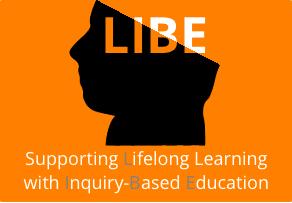|

Project Investigators
Alex Poulovassilis
George Magoulas
Project Staff
Konstantinos Karagkiozoglou
Other Project Partners
University Roma 3 (Coordinator)
Lillehammer University College
University of Porto
University of Twente
January 2014 - December 2015
Project Website
Project Sheet
|
Project Aims
The LIBE project is developing a VLE and associated multimedia Courses to support the development of key competencies amongst low educational achievers in the 16-24 age group, including literacy, numeracy, problem-solving, and IT literacy. The project is adopting an Inquiry-Based learning approach, extended with Computerised Adaptive Testing (CAT) and personalisation of the individual learner's experience.
Our role in the project includes elicitation of learners' and course designers' requirements; design of a database to hold information about students' interactions and test results captured as students work on courses provided by the VLE; incremental development of several components of the VLE - most notably the Personalisation Engine; and piloting, evaluation and enhancement of the VLE.
Current Status
We are developing flexible components that can be reused by other institutions and projects (Fig. 1). These are being built as Moodle plug-ins, and external applications communicating with these plug-ins, and will be made freely available through the LIBE VLE website at the end of the project.
The Personalisation Engine (Fig. 2) will provide functionalities such as: modifying the selection and sequencing of Learning Objects (LOs) on the basis of students' interactions with LOs and their test scores attained; providing different levels of expansion of specialist vocabulary occurring within LOs; and providing different levels of hints to learners following their answers to test questions.
Future Work
In the longer term, we are aiming to extend the VLE with a Learning Analytics component that will inform tutors in providing more effective support to students; course designers in improving and extending their Courses; and researchers/developers in improving the provision of scaffolding (feedback, hints, expansions)
to students and the intelligent components driving the system's personalisation functionalities. Learning Analytics will exploit various sources of information, including:
- Users' interactions (choices of LOs, visiting/revisiting LOs, clicking on words to see expansions, seeking help in undertaking activities)
- Users' test scores, number of attempts per question, time spent on each LO
- Hints requested by the student or given automatically by the system and level of explanation of the provided hints

Figure 1. The LIBE VLE architecture

Figure 2. Personalisation Engine
|